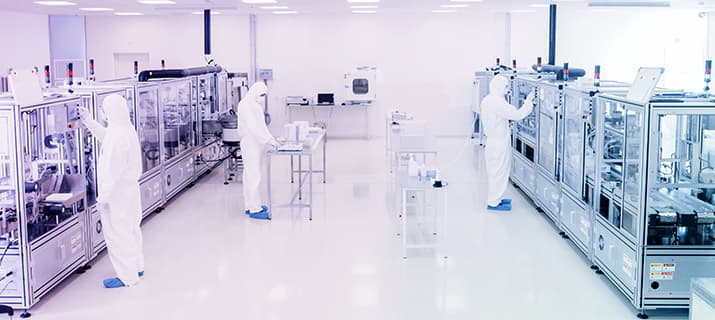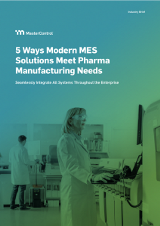GxP Lifeline
How Modern MES Solutions Meet the Demands of Pharma Manufacturing

You don’t have to wait to find the perfect balance between your current pharma manufacturing performance and the ideal level of performance you’re striving to achieve. You can begin by evaluating your production line(s) for efficiency and finding the gaps where it needs improvement. Two things will help you accomplish this:
- A standard to measure yourself against. This may be regulations that are aligned with current good manufacturing practices (CGMP) that you are beholden to. You may need to go beyond compliance and adopt additional standards of excellence and rigor to compete fiercely in an evolving global marketplace.
- A pharma manufacturing execution system (MES) that can give you visibility points all along the line and a way to pull and analyse the data that you need to evaluate and improve your efficiency. As often as you can obtain and analyse production metrics, you can make necessary adjustments to processes, equipment, and materials. Ideally, your MES solution should do this for you.
Impractical Realities of Legacy Pharma MES Solutions
Pharma MES systems have been available for 20 years. Still, not all pharma manufacturers are able to deploy them across all product lines because they can be cumbersome, expensive, and difficult to implement and use. That leaves legacy MES installations accessible to only high-priority production lines. Legacy MES solutions also lack modern capabilities that are proving vital in modern pharma manufacturing environments. These include quality management system integration, a cloud infrastructure, and the agility necessary for small or single batches – which are becoming more common.
How Are Legacy Pharma MES Systems Lacking?
Traditional pharma manufacturing management systems are marked by several deficiencies:
- Disconnected
- Undiscoverable
- Inefficient
- Inflexible
Most pharma MES systems are on-site installations without interconnectivity to other digitised systems, such as enterprise resource planning (ERP) systems and quality management systems (QMS).
Data managed within a legacy pharma MES system often requires complex analysis. Visibility is limited to on-site personnel. According to Deloitte, “data is the lifeblood of digital transformation” for life sciences companies, implying a company will not survive without it.1 Data that is not visible because it is offline or difficult to interpret is not useful.
When pharma MES systems fail to dynamically coordinate equipment maintenance and production schedules, it invites potential overlaps and interruptions.
Fixed hardware installations and custom coding prevent pharma manufacturers from reconfiguring the shop floor to respond to evolving regulations and changing market demands. Manufacturing precision therapies or single-product batches, for example, is becoming increasingly popular due to advancing technology and patient-centric initiatives.
Flexible Advantages of Modern Pharma MES Systems
Because a modern MES solution is based on eletronic batch records, you gain the ability to pre-set value ranges and thresholds and automatically flag missing or incorrect data. This serves to error proof your records. Further, because the electronic records are centralised, various operators and managers can access records simultaneously. Consequently, pharma manufacturing tasks move along more quickly. These efficiencies mean fewer nonconformances, less waste, and shorter lead times. It also means that you have real-time (and even remote if cloud-based) visibility into your production lines. All of this makes for an agile system that responds quickly to corrections, collaboration, and redirection.
What Can a Modern MES Solution Do?
Manufacturing facilities that are already using paperless, automated processes are able to speed up production by 50 to 100%.2 Think of a modern MES solution as the slim or sleek version of an MES that more and more pharma manufacturing companies will not be able to do without due to the following characteristics:
- Configurability
- Real-time visibility
- Efficiency
- Review-by-exception capability
You can set up pharma manufacturing software to match your existing production processes without requiring custom coding. This enhances your existing operations rather than forcing you to slow down and adapt to new ones. The fast and flexible responsiveness of a modern pharma MES system makes it easier to change production lines and accommodate small batches.
With a modern MES solution, data that was previously offline (blind spot) goes online so you can retrieve data as it’s being generated from local and remote locations. More useful data is a key indicator of an effective pharma MES system. Integrated data from various functional aspects of your operation that is accessible through a user-friendly interface truly brings you closer to manufacturing ideals and allows more timely engagement from more operatives all along the line.3
Error-proof electronic production records and automated workflows foster right-first-time batches. It requires less time to create and review electronic records than manual ones. Production records can move through review and approval cycles automatically and quickly because they allow electronic and remote sign-off.
Electronic production records allow pharma manufacturers to quickly target errors without having to review the entire record. Errors reveal themselves as exceptions to predetermined acceptable values.
Enhancing Pharma Manufacturing Performance
A modern MES solution is key to reaching rigorous pharma manufacturing standards without having to install a legacy solution. It’s worth the investment. Although modern solutions cost significantly less than legacy ones, they can support more products on more lines than a traditional MES solution can. On the other end of the spectrum, they can yield more, higher-quality products much faster than manual or paper-based systems. All in all, a modern MES solution is the golden mean – allowing pharma manufacturers to immediately achieve the ideal ratio of yield to quality in record time.
A modern pharma MES system raises the bar for sure, but not only for your competitors. Implementing a digital MES solution raises the bar internally as well. High-performing organisations know the value of pharma manufacturing software and don’t hesitate to adopt technology and innovate with it, even during financial downturns.4 Some have noted that they’ve been able to innovate their manufacturing processes and products since using a digital MES solution, such as MasterControl’s Manufacturing Excellence, in ways that they could not conceive of prior to using one. It’s only going to get better as intelligent technologies begin to shape the industry further.
Conclusion
Shifting to a modern MES solution is possible with careful consideration, planning, and implementation. It requires a new way of thinking about the complex processes involved in pharma manufacturing and finding technology that codifies best practices.5 Thankfully, the implementation of a modern MES solution can be measured in weeks or months – compared with the years it takes for a legacy installation. Don’t delay. The time is yours and the time is now.
References:
- "Deloitte Tech Trends 2022 Life Sciences perspective,” Todd Konersmann, 2022.
- "Digitization, automation, and online testing: Embracing smart quality control,” Norman Carra, Evgeniya Makarova, Jeff Morell, Matthias Ringel, and Vanya Telpis, McKinsey Apr 14, 2021.
- "Future thoughts about pharmaceutical manufacturing,” Giuseppe Menin, Manufacturing Chemist, Jan 19, 2021.
- "Despite recession fears, companies aren’t pulling back on technology investments,” By Susan Caminiti, CNBC, July 1, 2022.
- "Leveraging digital and analytics in biopharma operations: Six principles,” Stephanie Bayer, Sulay Sandy, Ulf Schrader, and Matthias Spiegl, McKinsey, May 27, 2021.

